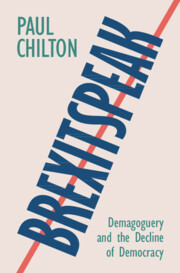Book contents
- Brexitspeak
- Brexitspeak
- Copyright page
- Dedication
- Contents
- Figures
- Acknowledgements
- Introduction: Populists, Demagogues, Language
- 1 Identity
- 2 We
- 3 The People
- 4 The British People
- 5 Fear of Foreigners
- 6 Fear of Foreigners Mobilised
- 7 How Demagogues Do It
- Conclusion: Brexitspeak, Demagoguery, Decline of Democracy
- Book part
- References
- Index
Introduction: Populists, Demagogues, Language
Published online by Cambridge University Press: 22 November 2024
- Brexitspeak
- Brexitspeak
- Copyright page
- Dedication
- Contents
- Figures
- Acknowledgements
- Introduction: Populists, Demagogues, Language
- 1 Identity
- 2 We
- 3 The People
- 4 The British People
- 5 Fear of Foreigners
- 6 Fear of Foreigners Mobilised
- 7 How Demagogues Do It
- Conclusion: Brexitspeak, Demagoguery, Decline of Democracy
- Book part
- References
- Index
Summary
The Introduction is a chapter-length outline of the of the book which does more than simply summarise. Though not exhaustive, it includes both explanation and discussion of the historical context of Brexit and Brexitspeak, combined with a description of the linguistic tools of analysis. The starting point is that without language politics could not happen, so it is essential to understand how language works in general and how it is strategically deployed by politicians. In this chapter populism is discussed as an unwritten ideology best characterised by its demagogic appeal to an idea of ‘the people’ within a nationalist notion of ‘the British people’, at the same time promoting a friend-foe antithesis, stirring up emotion and avoiding reasoned argument. Demagoguery is a little used term in political science but highly relevant to the present state of democracy. Indeed, demagoguery exploits and undermines democracy. It is both an effect and a cause of post-truth politics, where truthfulness and facts are overridden. The final section takes a closer look at the fundamentals of language and language use that are at issue in examining the discourse of Brexit.
Keywords
- Type
- Chapter
- Information
- BrexitspeakDemagoguery and the Decline of Democracy, pp. 1 - 21Publisher: Cambridge University PressPrint publication year: 2024

